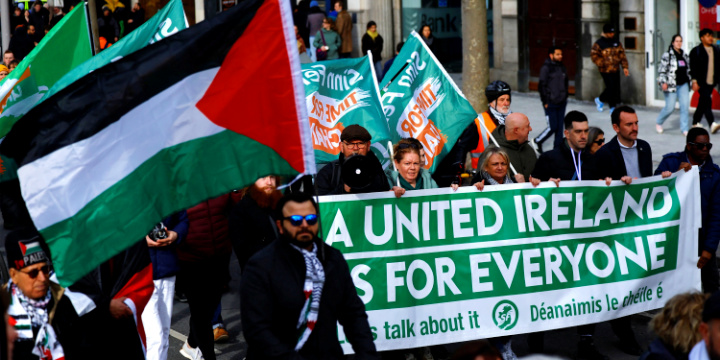A pro-Hamas demonstration in Ireland led by nationalist party Sinn Fein. Photo: Reuters/Clodagh Kilcoyne
A group of US lawmakers is calling on the Treasury Department to investigate and potentially penalize Ireland over proposed legislation targeting Israeli goods, warning that the move could trigger sanctions under longstanding US anti-boycott laws.
In a letter sent on Thursday to US Treasury Secretary Scott Bessent, 16 Republican members of Congress expressed “serious concerns” about Ireland’s recent legislative push to ban trade with territories under Israeli administration, including the West Bank, Gaza, East Jerusalem, and the Golan Heights.
The letter, spearheaded by Rep. Claudia Tenney (R-NY), called for the US to “send a clear signal” that any attempts to economically isolate Israel will “carry consequences.”
The Irish measure, introduced by Foreign Affairs and Trade Minister Simon Harris, seeks to prohibit the import of goods and services originating from what the legislation refers to as “occupied Palestinian territories,” including Israeli communities in the West Bank and East Jerusalem. Supporters say the bill aligns with international law and human rights principles, while opponents, including the signatories of the letter, characterize it as a direct extension of the boycott, divestment, and sanctions (BDS) movement, which seeks to isolate Israel as a step toward the destruction of the world’s lone Jewish state.
Some US lawmakers have also described the Irish bill as an example of “antisemitic hate” that could risk hurting relations between Dublin and Washington.
“Such policies not only promote economic discrimination but also create legal uncertainty for US companies operating in Ireland,” the lawmakers wrote in this week’s letter, urging Bessent to determine whether Ireland’s actions qualify as participation in an “unsanctioned international boycott” under Section 999 of the Internal Revenue Code, also known as the Ribicoff Amendment.
Under that statute, the Treasury Department is required to maintain a list of countries that pressure companies to comply with international boycotts not sanctioned by the US. Inclusion on the list carries tax-reporting burdens and possible penalties for American firms and individuals doing business in those nations.
“If the criteria are met, Ireland should be added to the boycott list,” the letter said, arguing that such a step would help protect US companies from legal exposure and reaffirm American opposition to economic efforts aimed at isolating Israel.
Legal experts have argued that if the Irish bill becomes law, it could chase American capital out of the country while also hurting companies that do business with Ireland. Under US law, it is illegal for American companies to participate in boycotts of Israel backed by foreign governments. Several US states have also gone beyond federal restrictions to pass separate measures that bar companies from receiving state contracts if they boycott Israel.
Ireland has been one of the fiercest critics of Israel on the international stage since the Palestinian terrorist group Hamas’s Oct. 7, 2023, massacre across southern Israel, amid the ensuing war in Gaza, leading the Jewish state to shutter its embassy in Dublin.
Last year, Ireland officially recognized a Palestinian state, a decision that Israel described as a “reward for terrorism.”
Click this link for the original source of this article.
Author: Corey Walker
This content is courtesy of, and owned and copyrighted by, https://www.algemeiner.com and its author. This content is made available by use of the public RSS feed offered by the host site and is used for educational purposes only. If you are the author or represent the host site and would like this content removed now and in the future, please contact USSANews.com using the email address in the Contact page found in the website menu.








